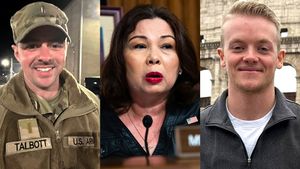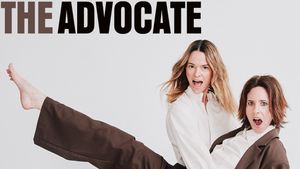Fischerspooner strategically planned their long-awaited comeback, releasing their first single in eight years in tandem with Pride Month this June. The new track, called "Have Fun Tonight," is a queer dance anthem about polyamory (or polyagony), set against throbbing electronic production that conjures the thick scent and sight of a sweaty, fog-filled leather club. It's seedy, celebratory, and ushers in an unapologetic era of "aggressively homosexual" pop from the iconic electroclash duo.
"Have Fun Tonight" is one of 13 tracks off Fischerspooner's forthcoming album, SIR, which was co-written and co-produced by R.E.M.'s Michael Stipe and BOOTS, who's behind Beyonce's last two albums, notably contributing to "Drunk in Love" and "Haunted." On the new LP, frontman Casey Spooner reflects on deeply personal stories, from parental abuse to mindless, unhealthy hookups and unfulfilled sexual fantasies--daring commentary on queer culture heightened by the presence of Stipe, whom Spooner lost his virginity to years ago.
Related | Gallery: Wet n Wild With Casey Spooner
With no official release date set for SIR, Spooner will perform material off the LP this weekend at The Pavilion in Fire Island to promote Fischerspooner's Brooklyn Steel show on October 27 (Tickets are available, here). We recently caught up with the tanned New York heartthrob to break down the long, tumultous journey behind Fischerspooner's comeback album--an exhausting process of love, heartbreak and sexual self-discovery.
OUT: I feel like Fire Island is your haunt--you've really become synonymous with the gay summer haven.
Casey Spooner: It's so weird, I never went to Fire Island until last year. I didn't like it. It wasn't my scene. It was too gay. It was bad taste. It was kind of lowest common denominator gay for me. I'm a music queen. I can't get into shitty Cher remixes, so I had a real problem. I dated a much younger guy--this hot, cool, young stud and he was obsessed with Fire Island. The minute we started dating, he was like, We have to go to Fire Island, so we went.
Meanwhile, I was having a personal crisis. My building was getting sold, I was getting evicted, my album was stalled--just general emotional turmoil. So I wasn't in the mood nor did I have excess income to go to Fire Island, but it was good because he forced me to take a vacation. I tend to overwork and not take care of myself.
When was the first time you went together?
He forced me to go for Memorial Day, and we went out and it was okay. I got it. We went to some pool parties. It was really crazy how you can wear whatever. I really got into that--just wearing a speedo and hanging out at the grocery store, eating chicken salad. It's really easy, like pool and rose, that's good. There's this amazing community--the social mechanism, where you get to meet people and have real conversations. Phones don't work out there because the Internet service is so bad, so you're off the grid.

Shorts: Charlie by Matthew Zink, Shoes: Nike, Jewelry: Tiffany, Socks: The Sock Man
You ended up staying in Fire Island for months. How did that happen?
My boyfriend and I went out for the 4th of July, the day after I couldn't find an apartment and moved everything into storage. I was really stressed out and basically homeless. We'd planned this vacation in the Pines and ended up breaking up that weekend--worst 4th of July ever. I was stranded, wandering around Fire Island, but then I ran into my friend, Faris Al-Shathir from Boffo, who introduced me to the right people.
My friend Todd Bishop, who works at the MoMA, became my island mother and I met all these other people who're art dealers, artists or patrons. This amazing couple, Tommy and Victor, had this big, beautiful house with six bedrooms and seven bathrooms. They said, Why don't you stay at the house for two weeks? So I shot a music video at my apartment before I got evicted, edited it and moved to Fire Island. Two weeks turned into two more weeks, and I stayed till October.
Sounds like the perfect escape.
It was amazing, but a little weird because I was in such a state of crisis. It forced me to stop, chill, process and be alone for the first time. I was in a really long relationship for 14 years that fell apart. We broke up, I traveled, slutted around, came back to New York, and then this new boyfriend snatched me up and forced me into a relationship. When we broke up, I could finally be like, Who the hell? What the fuck? What happened to my damn life?

Swim Bottoms: Charlie by Matthew Zink
In what ways did Fire Island impact you and your work?
Everything was timed perfectly, even though I was in a state of crisis and didn't like it. The record was delayed a year and it's being released post-Trump. If this record had been released before Trump, it wouldn't be nearly as important to me or impactful. To have a pro-queer record that's aggressively homosexual, that's exactly what we need right now. We didn't need it last summer.
We finished the record, and now I've spent the summer in the Pines. Everyone says I'm insane because I call it research, because I'm like, I need to be in the Pines and I need to experience gay culture on every level if I'm trying to reflect or comment or be a part of it. I made it an agenda to study and participate in queer culture. All my friends are like, That's having a midlife crisis cause you're up in the club and too old. I'm like, No, I'm getting work done. This is work. This is definitely work.
Did Fire Island shift the way you make music, sonically?
It changed my ear for pop music. I didn't really understand the diva and spending the summer out there really shifted my ear. I became obsessed with Ariana Grande's "Into You." The emotion in that song--I don't know what it is. Maybe it was because I was post-breakup and lost on an island, but surrounded by incredibly attractive men and feeling disconnected. I identified with the heartache in that song, because she's begging someone to be with her. "A little less conversation, a little more touch my body." God damn, that's good.

Tank: Spark Pretty, Underwear: Adam Dalton Blake, Jewelry: David Yurman
While making this new album, you also created a photo book, called EGOS: Character Studies, Online Marketing, and Prelude to New Music. How does that project play into SIR?
That book was a mood board that happened in the middle of making the record. We always work on film, photography, music and performance simultaneously. That's the best way for me to make something, when they're all informing each other. When our publisher approached us about a book, there were two ideas cooking: One was this collaboration with Yuki James. It was a psychosexual landscape shot in my private space. The other was this Internet project where I shifted away from avant-pop, robot fashion queen and into an older, sexualized man.
I was shooting with all these different photographers and reflecting on this neo-soft core porn performance of eroticized self. It wasn't about me, it was about me going into these shoots with photographers and giving them no direction. All I needed out of it was one image. Because I didn't change, it became a portrait of contemporary photography and how people make photography superimposed over one subject. That's the book: Character studies and marketing, and they set the tone for who's singing the songs, so you know the character before he arrives.
You've certainly landed on a very specific character--this '70s muscle daddy archetype.
I've landed [laughs]. It was an accident. I was in a [Wooster Group] play, called Cry, Trojans!, and it was an adaptation of Troilus and Cressida. All the actors wore very little clothing--just a wig, a loincloth and a mic pack. Everyone in the show had incredible bodies, so we all got very competitive. We called it, "Body Wars." I didn't have a lot of lines in the play, so my function was really to be a set piece--like seeing a diorama in a natural history museum. I had to look expensive, valuable and powerful. I trained to create that image and also wanted to comment on the Hollywood image of classical cultures, like 300 and all these ridiculous history films where guys are jacked on steroids and wearing black eyeliner.

Top: Charlie by Matthew Zink, Jewelry: David Yurman
You ultimately chose to keep the look. Why?
I could tell I was getting a reaction, and this was a solution to me trying to evolve artistically because I felt the whole electroclash image had become so mainstream. When we did ridiculous costumes and wigs, that was unheard of. Now that's common place. Everyone in show business has a colored wig and a freaky outfit, so how the hell am I going to evolve now that that thesis has been absorbed and exhausted? Well, I can be older, I can be gay, I can be a man and sexual, which you don't see. We're living through a sexual revolution in the gay community. It's a generation that doesn't have fear of HIV for the first time, so I think there's a type of sexual freedom I'm experiencing that is connected to this type of '70s image.
As someone who's constantly evolving, do you have your next character planned out?
This is the longest I've ever looked the same. I usually change my look at least once a year, and I actually felt trapped by the look because it's not my nature to stay the same so long. I've got to at least get the album out, establish the look, let everybody see it, do one lap around the world, then I can change. And then everybody can gag at the change. They'll go, Oh my God, blonde! Oh my God, he cut it all off! Oh my God, he doesn't have a mustache! Oh my God, he's ugly! Oh my God, he's fat!
Would you ever do that?
I've had fat phases. I don't know if I could do it again. I'm not opposed to it, but it's just uncomfortable. More than the way I look, I like the way I feel. I love feeling strong. It feels great to be able to use your body. You really have to monitor abusing your body, especially in gay culture, in order to achieve an image. It's not worth it. I beat the shit out of myself at CrossFit and boot camp until my left knee hurt, my hip was weird, my shoulder was weird.
Right now, I'm in a phase where I'm not going to torture myself. I don't want muscles made out of anxiety, I want muscles made out of joy. Goals are great, but I don't think it's good when it's built out of the wrong intention. I was seeing a therapist and she was like, You realize you're medicating with fitness, but I was like, Bitch, what would you rather me be medicating with? So what if I'm running on a treadmill like a maniac three times a day? I'm completely happy. I don't need him. I never needed him. [Laughs]

Singlet: Adam Dalton Blake, Sneakers: Jimmy Choo, Jewelry: Tiffany, Socks: Topman
Do you make music out of anxiety?
I don't know if I'd call it anxiety, but it's pain and emotion. You have to work it out. I made this album in the middle of my long relationship. When I started, it was an optimistic record. I was super happy. I was in a great place, happily married, two cats, open relationship, incredible, great trust, great communication. It was done, happily ever after. Scene. But the relationship fell apart, and as I was writing, that ended up becoming part of the narrative. It was optimism into collapse, but in the end, I ultimately returned back to being happy--couple into chaos into sluttery into rebound into being happy alone.
How did "Have Fun Tonight" come about?
Post-Fire Island and my love affair with Ariana Grande, I wanted to make a queer dance floor anthem that had the kind of pathos of "Into You." The song we wrote was called "Have Fun Tonight." It started as an instrumental Warren played during our show in Mexico City, and he was like, Why don't we put the song on the record? BOOTS, who worked on the last two Beyonce records, heard the song and was a big fan. He worked on the song, and came back in to do additional production on several other songs off the album. That was another reason it's good the record was delayed a year.
He brought in his mixer, Stuart White, and it vastly improved all the singles. We'd finished the album in February and mixed it in March, but then I had Stuart remix everything the last three-four months. He was a little busy working on the Jay-Z record, so I was sandwiched in-between Beyonce and Jay-Z. BOOTS was like, Casey, the only reason Stuart gets to work on this is because Beyonce is pregnant right now. The minute she has these babies, you'll never see him again, so work as fast as you can. Every time he finished a song, I was like, Stuart, here's the next one. Stuart, here's the next one. [Laughs]
Perfect timing.
And the strange coincidence that she named one of her babies after the record, SIR. Isn't that weird? I need to make a onesie for the baby with the logo.

Shirt: Topman, Shorts: Worship Vintage
Your new music has a very dark, aggressive sound. Was that purposeful?
Yeah, that's Warren [Fischer]--very Butch. The older music was more dramatic and operatic. Warren also comes from more classical music, so he loves drama. But once he understood the themes of my lyrics, then he got the mood. He knew how to illustrate what I was trying to express.
What are the themes on SIR?
Contemporary homosexuality--reflecting on it and how things are changing. It's very different now with Grindr, Scruff and TRUVADA, and being able to be sexually free and connect with people, but also feel really disconnected from people. Technology is a distraction and you're not really meeting people. When I became gay, you didn't know what was going to happen when you went to bed with someone. You just had to go with the vibe, which is good and a different set of risks.
Now, a lot is lost. A picture is not a person. People can have amazing pictures and great bodies, but they can be assholes or be stupid. They can be a lot of things you can't read through these interfaces. But people are still dealing with shame. They're dealing with drugs and alcohol abuse. They're dealing with sex addiction and intimacy issues. That's contemporary homosexuality--it's incredible and awful.

Swim Bottoms: Charlie by Matthew Zink
What specific songs speak to these queer issues?
"Stranger Strange" is about a guy picking me up in a subway station and whipping me, and me having strange associations with my father because he used to whip me as a child. "Oh Rio" is basically my coming out story, about how I would go to this book store that had a Bruce Weber book, called Oh, Rio. I didn't have access to pornography or anything homosexual except this one book in this one bookstore that wasn't pornographic, just Brazilian guys in Speedos. I'd pick up that book and be fascinated by it, then have feelings and get freaked out and put it back on the shelf.
In my head, Rio became this dream sexual realm. Every year I was on tour, I was in Sao Paulo or there was a drug war and I couldn't go to Rio. Finally I got to Rio in winter of 2013-14 and I was completely exhausted. I was sick. I'd come from New York. I was pasty and out of shape, and all of the sudden in my dream sexual landscape. I could not have been more unsexy, coughing on a beach with a cold and jammed into a Speedo. So "Oh Rio" is about me getting to that place it not being the dream come true.
"Top Brazil" is about a terrible hookup in Rome the day after an incredible hookup in Rome--this kind of thing where you have sexual compulsion and you're like, I want another one, instead of settling and savoring. Eventually you're going to crash and burn and have a terrible experience. You can't remember the good ones because you stepped on them with so many shitty experiences.

Top: Topman, Shorts: Charlie by Matthew Zink, Jewelry: Tiffany
You're known for outlandish live shows. Have you performed anything off SIR yet?
I performed "Everything is Just Alright" in Madrid for this gay, leather sex party for Pride. That was the song to play there. It was so tough. The lyrics are, "I smell the smoke, I smell the piss, I smell the anger. In the wind, this isn't fun, and I'm not nice and it's exactly what you like. I'm kinda buzzed, you're kinda dumb, and everything is just alright." Like, hello. [Laughs] It sounds really good with a bunch of shirtless dudes dancing in a leather party in Madrid in 4 AM.
The template for Fischerspooner shows in the past came from boy bands in the late '90s--core, unison pop dance. But this record is more emotional, so the challenge is how to make it dramatic and exciting, and magnify the emotional quality as much as possible. I have some ideas, I love the stage.
I bet you do. [Laughs]
It's religious for me. It's holistic--really like mind, body, spirit. All of you is required. It needs to be intelligent, you need to speak with clarity, but then you're physically giving everything you can and sacrificing your body on a daily basis. When it's good, the audience is in a similar space, having a mind, body, spirit connection.
Most people would be afraid to openly perform the material on SIR. Does it take a certain strength to sing these vulnerable songs for an audience?
Michael Stipe says the thing he admires most about me is my fearlessness. I just do my thing, and I don't have a lot of shame or embarrassment, which can be my greatest strength and my greatest weakness, because I'll do anything. I think I'm a little nervous because this is the first time I'm making something where I'm exposed in a lot of ways. Whenever I've released a record or done a performance, I don't look like that every day. I'm transformed with costume, hair and makeup, but in the end I take it off and go home as plain person. With SIR, it's very different because I look like the character on and off-stage.
Photography: Kristiina Wilson
Styling: Shea Daspin
Sittings Editor: Elizabeth NeSmith
Grooming: Casey Geren
Location: Aly Cohen













































































